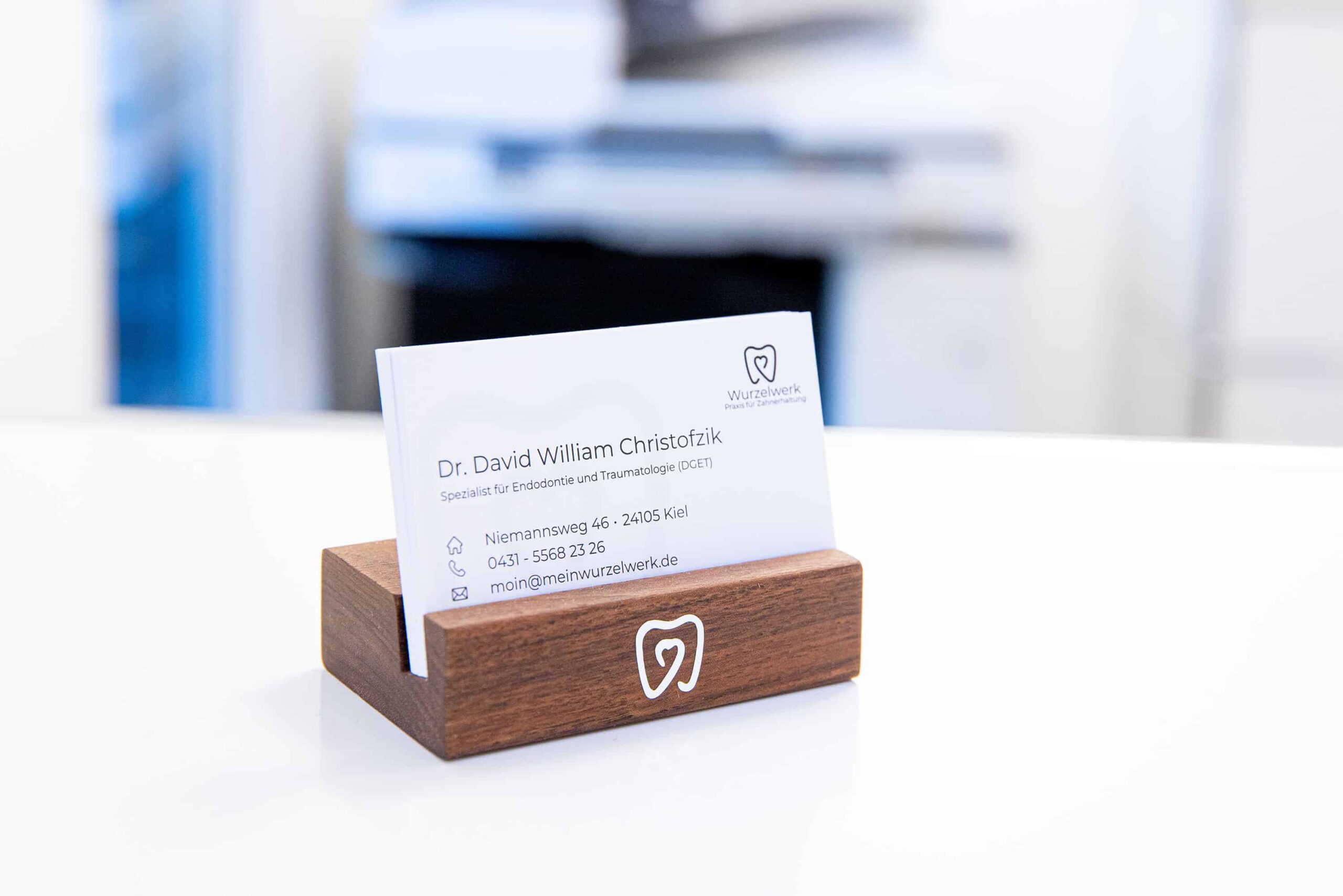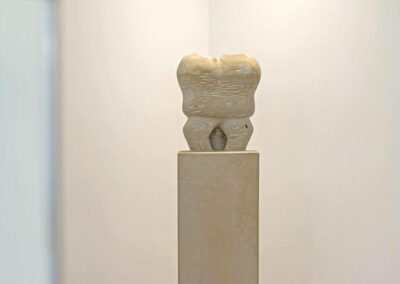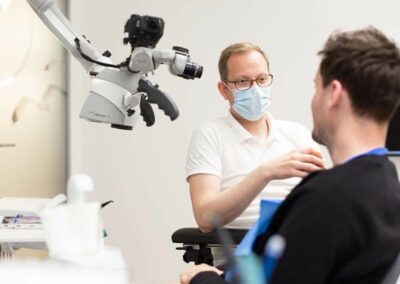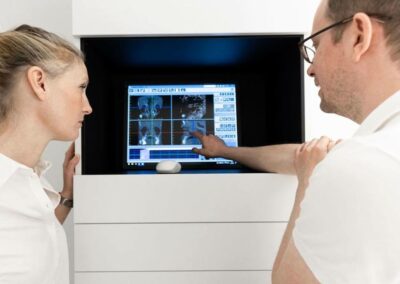Modern therapies
Periodontology Kiel
– Your dentist for periodontitis treatments
Appt.
For healthy teeth & gums
Prevent diseases
Bleeding gums, receding gums, tartar and bad breath are the first signs of periodontitis, colloquially also called periodontosis. Often, these complaints can be remedied by professional teeth cleaning or periodontal therapy.
Periodontitis is an inflammation of the periodontium caused by bacteria. Dental treatment is very important, otherwise tooth loss may occur. In addition, periodontal disease can lead to diabetes and cardiovascular disease. There are many other negative effects on general health that current research is addressing.
Causes of periodontitis are usually insufficient tooth cleaning. With the help of regular professional dental prophylaxis, it is possible to preserve teeth for a lifetime. Tartar and other deposits prevent one’s own daily cleaning of the entire set of teeth at home. In addition, genetic predispositions, as well as smoking and diabetes itself, often lead to an increased risk of periodontitis.

When do I need to have my teeth professionally cleaned
?
Professional teeth cleaning
Professional teeth cleaning can prevent periodontal disease and is one of the most important preventive measures in dentistry. Bacteria and biochemical processes often cause deposits, as well as tartar, which lead to unpleasant bleeding gums and bad breath.
Cleaning your teeth every six months at the dentist’s office prevents inflammation and gum recession and prevents bacteria from spreading uncontrollably.
Signs of periodontitis
If any of the following signs appear, we recommend that you see your dentist promptly for a diagnosis and a professional dental cleaning:
- Frequent bleeding gums
- Visible plaque
- Loose teeth
- Gum recession
- Reddened gums
- Unpleasant taste
- Yellowish secretion – pus
- Frequent bad breath
Can you prevent periodontitis yourself?
Yes, daily use of dental floss or interdental space brushes (toothbrushes) can reach areas of the teeth that are inaccessible to the toothbrush.
In addition, the gums should also be massaged with the toothbrush, this stimulates the blood circulation and can prevent gum recession. In an individual dental consultation, we determine the appropriate dental brushes and cleaning technique with you.
Procedure for
periodontitis treatment
The aim of a dental periodontal therapy is to eliminate or remove the bacteria and plaque. Professional tooth cleaning and cleaning of the gum pockets form the basis of the treatment. In the case of incipient periodontitis, this is usually sufficient. At a follow-up appointment, we check together whether the treatment has been successful.
Our aim is to successfully treat periodontitis in the long term with gentle procedures and regular professional tooth cleaning.Thanks to the modern technical equipment in the dental practice and the further training of our dentists and dental assistants, we can offer you a wide range of options for the preservation of teeth, gum tissue and bone.
Professional teeth cleaning with modern Air-Flow device
Thanks to the extensive equipment in the dental practice, we can offer our patients a dental cleaning with the state-of-the-art powder water jet device. It combines a very gentle and at the same time efficient form of professional tooth cleaning compared to conventional hand instruments. It is ideal for removing superficial stains and tartar in a short time.
For deeper discolouration, we offer the modern Icon infiltration system as well as tooth bleaching. We will be happy to inform you about the appropriate treatment in an initial consultation after assessing your dental status and together we will find an overall concept that is as gentle and effective as possible.
01
Individual
Initial consultation & findings
In an initial appointment to get to know you, we will discuss your wishes with you, take a report of the findings and, if necessary, carry out X-rays. Then we discuss the therapy options together and plan the treatment. Only in close coordination can we achieve the best possible goal.
02
Initial therapy
The following treatment session begins with professional teeth cleaning. In the process, teeth are freed from plaque and tartar. Deposits visible in the X-ray image under the gums are also removed gently and efficiently.
Finally, the teeth are flouridated to prevent caries and plaque formation.
03
Reevaluation
After about 6 to 8 weeks, the treatment results are re-evaluated. As a rule, we can then jointly determine a six-monthly or annual rhythm for professional tooth cleaning. If further therapy steps are necessary, we will discuss the therapy options and decide on the procedure with you.
04
Long-term tooth preservation
It is important to promote the preservation of teeth through regular brushing, the use of dental floss or interdental brushes, as well as regular professional dental cleaning. Certain risk factors such as smoking, diabetes or certain genetic dispositions can lead to periodontitis at an early stage. Therefore, it is important to detect periodontitis early or to prevent it preventively.
Glossary periodontits
For very narrow interdental spaces, classic professional tooth cleaning is usually not enough. Deposits and tartar are often also found underneath the gums. This is where professional tooth cleaning reaches its limits.
Dental hygiene, on the other hand, involves cleaning the teeth above and below the gums. This form of treatment is one of the most efficient methods for periodontitis.
Cariogenic factors increase the risk of caries. In addition to sugar, acidic foods (lemons) and drinks (fruit juices, ginger tea) also damage tooth enamel. This leads to sensitive, painful teeth and increases the risk of tooth decay.
Recession is the term used to describe gum recession. The root of the tooth becomes visible, the teeth appear “longer” and the exposed areas are very sensitive.
Possibilities in periodontal treatment
- Preservation of almost all teeth
- No bad breath
- Prevention of gingival recession
- Bone preservation, which is important for stable teeth and dental restorations (implants)
Frequently asked questions about periodontal treatment
How do you recognise periodontitis?
The harbinger of periodontitis is gingivitis, which is usually associated with bleeding and receding gums.
In the further stages, gingivitis turns into an inflammation of the periodontium (periodontitis / periodontosis). This can be detected and treated by the dentist at an early stage. For patients, it only becomes noticeable in the later stages in the form of tooth loosening.
Can you prevent periodontitis yourself?
Basically, caries and periodontitis can be prevented through good oral hygiene and regular professional dental cleaning. You should brush your teeth twice a day and, in consultation with your dentist, clean your interdental spaces with dental floss or selected interdental brushes. A number of other factors, such as genetics, lead to periodontitis despite good oral hygiene. An already advanced stage of periodontitis requires a presentation to the dentist.
Why do teeth become loose if periodontitis is not treated?
Deposits under the gums (calculus) combined with increased bacterial colonisation lead to immunological defence reactions of the body. The acids of the bacteria and the body’s defence processes cause the bone (periodontium) to recede. As there is no improvement without dental treatment, the teeth become increasingly loose. Early treatment by your dentist in Kiel can ensure the preservation of your teeth.
Are antibiotics useful in periodontal therapy?
Treatment with antibiotics is not necessary in every case. Depending on the severity of the periodontitis and individual circumstances, the dentist will give you recommendations for a suitable therapy. Thanks to the comprehensive technical possibilities in the Wurzelwerk Periodontology in Kiel, as well as the experience of our dentists, we can offer you the appropriate treatment approaches.
Make an appointment for professional teeth cleaning
When can we be there for you?
You are welcome to call, write a message or make an appointment directly online:







